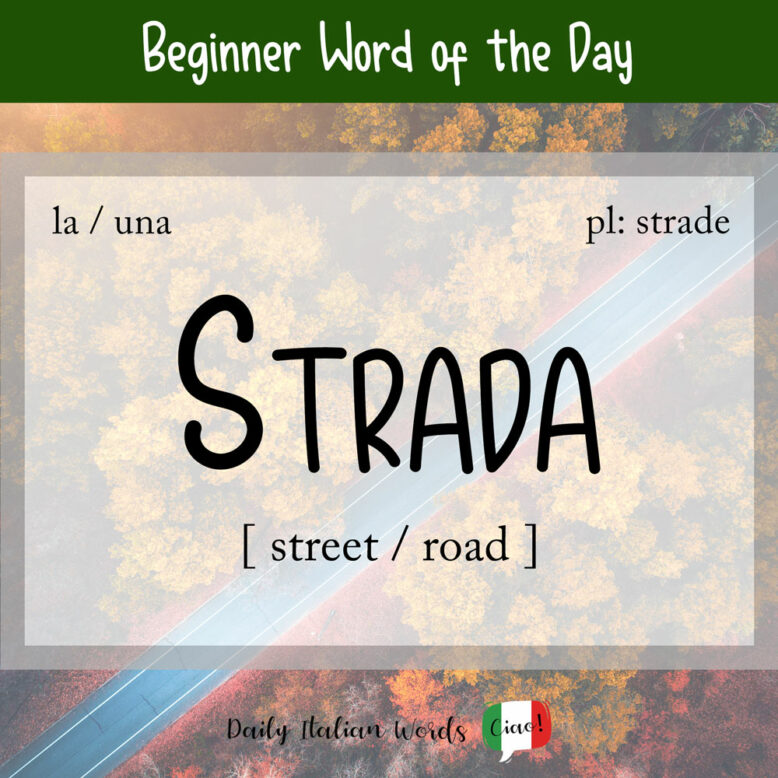Strada (feminine, plural: strade) is an incredibly flexible word in Italian.

Not only does it mean road or street in the literal sense, but it also has a couple of figurative meanings, as we’ll discover below.
Io abito in strada San Giusto. È in campagna.
I live on San Giusto street. It’s in the countryside.
One meaning is the path or direction one takes in life.
Ognuno di noi deve scegliere la propria strada.
Each of us must choose his or her own path.
The second is a way or method of doing things.
A volte la strada giusta è quella più difficile.
Sometimes the right way is the hardest way.
In a literal sense, strada can also translate as path, passage, channel or route.
Below are a few expressions containing the word strada that are related to roads and traffic:
- per strada = on the way
- chiedere la strada = to ask for directions
- cambiare strada = to change direction
- sbagliare strada = to go the wrong way
- dare sulla strada = street view (from a building)
- codice della strada = highway code
- strada secondaria = B road
- strada provinciale = country road
- autostrada = motorway
- strada ferrata = railway
An expressway is known as a strada a scorrimento veloce whereas a highway is referred to as either a strada statale or strada principale.
You may have come across the expression farsi strada. It can be translated as to make (one’s) way in a literal sense or to make advances / rise in the ranks / gain ground in a figurative sense.
Mi sono fatto strada tra la folla.
I made my way through the crowd.
(Lui) vuole farsi strada nella società.
He wants to rise in the ranks of society.
A close synonym of the word strada is via. Whereas strada refers to the generic concept of road or street, via is almost always followed by the name given to the road, such as for example, Via Garibaldi. In a figurative sense however, via can replace strada in some cases. For example:
La via / strada per il successo è ricca di sfide.
The road to success is full of challenges.

Expressions with the word “strada”
Below is a series of expressions featuring the noun strada. Some of them can be used in the context of roads/traffic whereas others have a more figurative meaning.
Tagliare la strada
Literal : to cut the road
Meaning : to cut (someone) off
Figurative : to make it difficult for someone to achieve something
Ritrovarsi in mezzo alla strada
Literal : to end up in the middle of the road
Meaning: to become homeless, to be ruined
Divorare la strada
Literal : to devour the road
Meaning : to go fast (on the road, very fast driving)
Essere fuori strada
Literal : to be off-road
Meaning : to be wrong
Spianare la strada
Literal : to level the road
Meaning : to pave the way
La Strada nel Bosco – Luciano Pararotti
To end off, let’s listen to a beautiful piece called La Strada nel Bosco (The Road in the Forest), written by Ermenegildo Rusconi, Cesare Andrea Bixio and Nicola Salerno and sung by the great Luciano Pavarotti.
Le prime stelle in cielo brillano già,
Tra i biancospini il vento mormora e va.
Sembra un incanto il bosco sotto la luna,
Favole appassionate narra per te.
Vieni,
C’è una strada nel bosco,
Il suo nome conosco,
Vuoi conoscerlo tu?
Vieni,
È la strada del cuore,
Dove nasce l’amore
Che non muore mai più.
Laggiù tra gli alberi,
Intrecciato coi rami in fior,
C’è un nido semplice
Come sogna il tuo cuor.
Un usignolo a sera sospirerà
Ed ogni fata in fronte ti bacerà.
Canta il tuo cuore il bosco la ninna nanna
Mentre una culla bianca prepari tu.
The first stars in the sky are already shining,
Among the hawthorns the wind murmurs and goes.
The forest under the moon looks like a charm,
Passionate tales narrate for you.
Come,
There is a road in the woods,
I know its name,
Do you want to know it?
Come,
It is the way of the heart,
Where love is born
That never dies again.
Down there in the trees,
Intertwined with flowering branches,
There is a simple nest
How your heart dreams.
A nightingale will sigh in the evening
And every fairy on your forehead will kiss you.
Your heart sings the woods the lullaby
While you prepare a white cot.
Heather Broster is a graduate with honours in linguistics from the University of Western Ontario. She is an aspiring polyglot, proficient in English and Italian, as well as Japanese, Welsh, and French to varying degrees of fluency. Originally from Toronto, Heather has resided in various countries, notably Italy for a period of six years. Her primary focus lies in the fields of language acquisition, education, and bilingual instruction.


